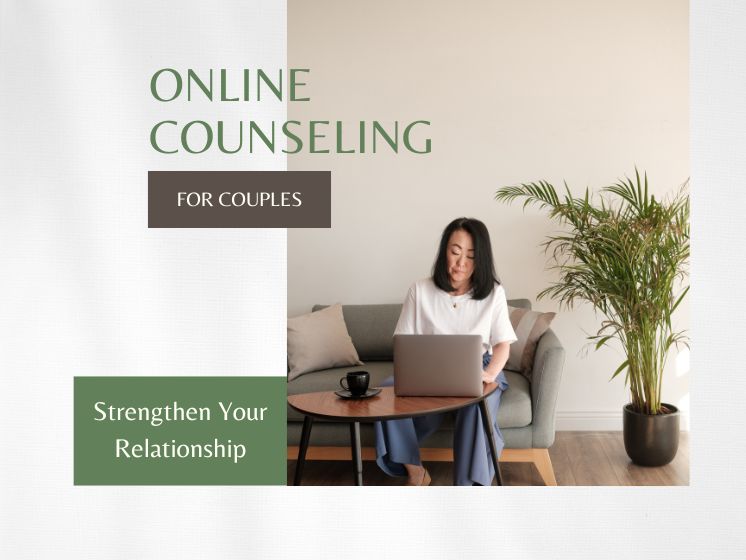Relationships are the foundation of our emotional well-being, but even the best partnerships can face challenges. Every couple will experience difficulties, whether communication problems, trust issues, or day-to-day stress.
The good news is that help is more readily available than ever before. Online counselling provides an accessible, effective means of strengthening your relationship in the comfort and privacy of your own home.
This blog will explore how online counselling can help couples and how Focus Therapy can help you and your partner build a healthier, happier connection.
What Is Online Counselling for Couples?
Online counselling for couples, or online couples therapy, is professional guidance provided via secure video sessions, phone, or even messaging. Rather than seeing a counsellor in person, you and your partner meet with a trained therapist from anywhere you can access the internet.
Sessions are conducted by a qualified, accredited counsellor who leads you and your partner through discussions, activities, and techniques to work on your specific issues. The aim is to establish a secure, non-judgmental environment in which both partners feel heard, understood, and able to make positive changes.
Focus Therapy sessions are based on a person-centred approach. The therapist guides you both to explore your feelings, enhance communication, and discover solutions that suit you as a couple.
Why Consider Online Couples Therapy?
People are busy these days, so it is not always easy to make time for traditional face-to-face therapy. Online counselling eliminates several barriers that could otherwise keep couples away from help. Below are some reasons online couples therapy may be ideal for you:
Convenience and Flexibility
No need to commute or rearrange your schedule. Online sessions can fit around work, family commitments, and different time zones. You can join from home, the office, or wherever you feel most comfortable.
Comfort and Privacy
Some couples feel more at ease discussing sensitive topics in a familiar environment. Online therapy allows you to open up from the comfort of your own space, making sessions more productive and less intimidating.
Access to Qualified Therapists
If you live in a remote area or have limited local options, online counselling connects you with experienced, accredited professionals like Donna Tibby at Focus Therapy, regardless of location.
Continuity of Support
Travel, illness, or unexpected life events don’t have to interrupt your progress. Online sessions can continue wherever you are, ensuring consistent support.
Anonymity and Reduced Stigma
For some, the idea of seeking therapy can feel daunting or embarrassing. Online counselling offers privacy that can make it easier to take that first step.
Benefits of Online Counselling for Couples
Online couples counselling offers all the advantages of traditional therapy, plus some unique benefits:
Improved Communication
Many relationship issues stem from misunderstandings or poor communication. A skilled online counsellor helps you express your thoughts and feelings more clearly, listen actively, and break negative patterns.
Conflict Resolution
Every couple argues, but it’s how you resolve disagreements that matters. Online therapy provides tools and techniques to manage conflict constructively, so you can address issues without damaging your bond.
Rebuilding Trust
Trust can be rebuilt with guidance and commitment, whether due to infidelity, broken promises, or past hurts. A counsellor can help you understand the root causes, restore safety, and move forward together.
Deepening Intimacy
Emotional and physical intimacy are vital for a fulfilling relationship. Online counselling can help you reconnect, rediscover each other, and nurture closeness.
Personal Growth
Therapy isn’t just about fixing problems—it’s about growth. As you work through challenges, you will gain new insights, develop empathy, and become stronger as individuals and as a couple.
Coping with Life Transitions
Significant life changes such as becoming parents, moving, or dealing with loss can strain even the healthiest relationships. Online counselling offers support and strategies to navigate these transitions together.
How to Get Started with Online Couples Therapy?
Starting online couples counselling is straightforward, but preparation can help you get the most from your sessions:
Find the Right Therapist
Look for a licensed therapist with experience in couples counselling. Many online platforms allow you to browse profiles and specialities to find someone who matches your needs and values.
Prepare
Ensure you have a stable internet connection, a private space free from distractions, and a device with a camera and microphone. Test your setup before your first session to avoid technical issues.
Set Shared Goals
Before your first session, discuss what you both hope to achieve with your partner. Common goals include improving communication, rebuilding trust, or resolving specific conflicts.
Be Open and Invested
Successful therapy requires both partners to be committed to the process. Approach sessions with an open mind, a willingness to listen, and a readiness to work together.
Complete Necessary Paperwork
Most therapists will send electronic consent forms and questionnaires before your first session. These help your therapist understand your history and tailor their approach.
Engage Actively
During sessions, communicate honestly, listen without judgment, and be willing to try new strategies. Your therapist may assign exercises or worksheets to practise between sessions.
How I Can Help: Focus Therapy’s Approach?
I am Donna Tibby, a person-centred integrative counsellor with extensive experience supporting individuals and couples through life’s challenges. My approach is warm, non-judgmental, and tailored to your unique needs.
What to Expect
- Safe, Confidential Space: Whether online or in-person, you will find a welcoming environment where both partners can speak openly and honestly.
- Person-Centred Approach: You are the experts on your relationship. I listen with empathy and respect, helping you find answers and solutions.
- Practical Tools: Together, we will explore communication techniques, conflict resolution strategies, and ways to nurture your connection.
- Flexible Sessions: Online appointments make it easy to fit therapy into your busy lives, wherever you are.
Who Can Benefit?
- Couples facing communication breakdowns or frequent arguments
- Partners struggling with trust, intimacy, or emotional distance
- Those navigating major life changes or stressors
- Anyone wanting to strengthen and future-proof their relationship
Why Choose Focus Therapy?
- Accredited and Experienced: As a member of BACP and NCPS, I uphold the highest standards of professionalism and ethics.
- Inclusive and Supportive: All couples are welcome, regardless of background, orientation, or relationship stage.
- Accessible: Online sessions mean you can access support wherever you are, with flexible scheduling to suit your needs.
Ready to strengthen your relationship? Contact me to learn more about online couples counselling and book your first session.

